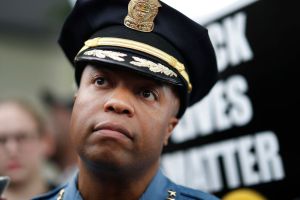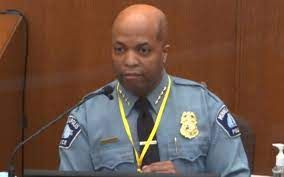Minneapolis Police Chief Who Fired Derek Chauvin Testifies On Day 6 Of Trial

Source: Star Tribune via Getty Images / Getty
Minneapolis Police Chief Medaria Arradondo testified against Derek Chauvin on Monday, the former officer accused of killing George Floyd last May, sparking another heightened call for justice in the Black Lives Matter movement.
Arradondo, the city’s first Black chief, spoke out early in the days after Floyd’s death, where he famously categorized it as a “murder.”
Remember, in June Chief Medaria Arradondo wrote,
“Mr George Floyd’s tragic death was not due to a lack of training—the training was there. Chauvin knew what he was doing…what happened to Mr. Floyd was murder.”#DerekChauvin https://t.co/OLWIeJRb3R pic.twitter.com/iAAh7KtCRG
— Omar Jimenez (@OmarJimenez) April 5, 2021
“Mr. George Floyd’s tragic death was not due to a lack of training — the training was there,” Arradondo said last year. “Chauvin knew what he was doing.”
Arradondo, 54, has over 30 years of experience with the MPD, serving in the force since 1989. He became police chief in 2017.
“We are oftentimes the first face of government that our communities will see, and we will oftentimes meet them at their worst moments,” Arradondo said on Monday during his testimony. “It’s very important that we meet our community in that space, treating them with dignity.”
Arradondo’s testimony, which opened week two of the trial, was closely watched in order to examine Chauvin’s training, his role as a sergeant and his use of force. While the public sphere undoubtedly sees Chauvin’s actions as heinous, he is still subject to a jury trial. But the optics of an officer giving testimony on the side of the prosecution against another officer were striking.
Last year MPD invested over 12 million dollars in training services according to Arradondo.
“We have to make engagement with our community healthy,” he said.
The MPD’s use of force policy states that “MPD officers shall consider verbally announcing their intent to use force,” which includes displaying the weapon they intend to use in their actions.
“The goal is to resolve the situation as safely as possible, so you always want to have de-escalation layered in those tactics,” he said.
The policy also states that an officer “should consider a subjects lack of compliance is a deliberate attempt to resist or an inability to comply based on factors including, but not limited to: medical conditions, mental impairment, developmental disability, physical limitation, language barrier, influence of drug or alcohol use,” or a behavioral crisis.
Arradondo’s testimony echoes the thoughts of other law enforcement officials who have taken the stand in the Chauvin trial. Last week veteran Minneapolis police lieutenant Richard Zimmerman testified that it was “totally unnecessary” for Chauvin to kneel on Floyd’s neck during his arrest, which subsequently lead to his death. Chauvin’s defense team has tried to lay Floyd’s murder as a result of an addiction to fentanyl.
SEE ALSO:
Derek Chauvin’s Murder Trial: Eyewitnesses Relive The Trauma Of Watching George Floyd Die
Testify, Donald Williams! George Floyd Eyewitness’ Unflappable Testimony Is Golden
[ione_media_gallery id=”4072430″ overlay=”true”]

